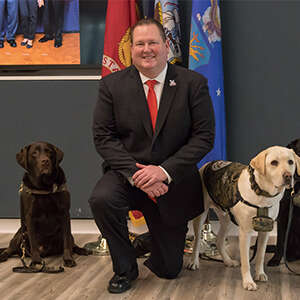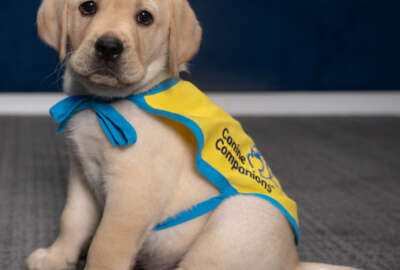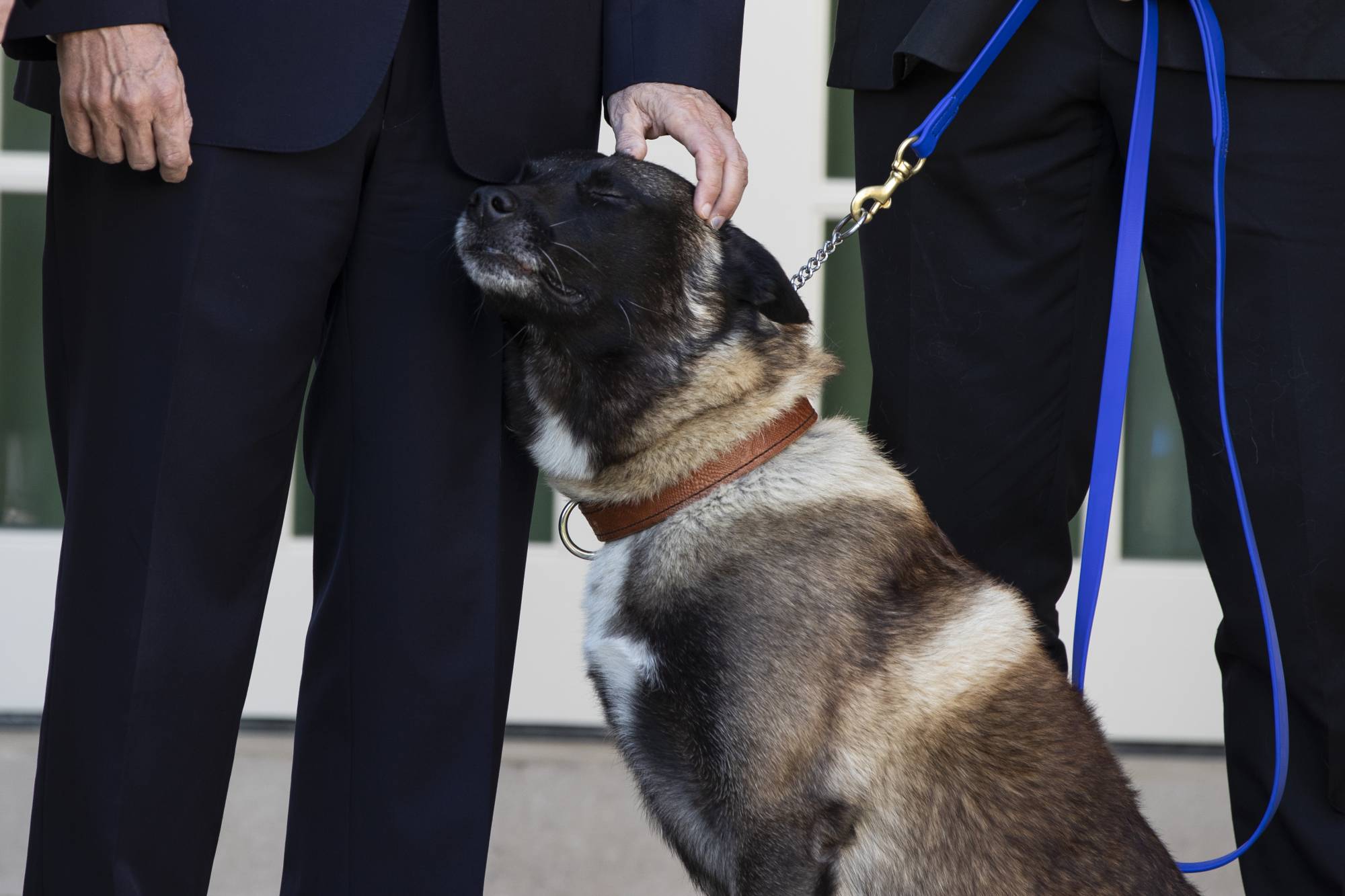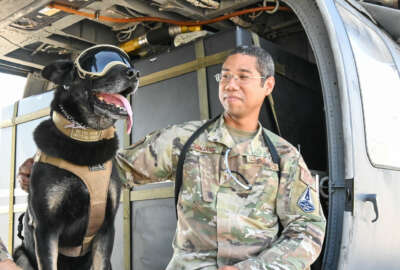If this bill passes, U.S. Mint would start issuing bite coin
Now a bill in Congress would instruct the U.S. Mint to make coins that commemorate service dogs.
Dogs are more than pets. They assist the blind, the emotionally troubled, and people stuck in hospitals. Dogs do countless tasks in law enforcement, military operations and national security. Now a bill in Congress would instruct the U.S. Mint to make coins that commemorate service dogs. Surcharges would go to an organization called America’s Vet Dogs. For more, the Federal Drive with Tom Temin spoke with John Miller, the President and CEO of America’s VetDogs.

Interview Transcript:
Tom Temin And your organization is concerned with those dogs that can help veterans in their needs and get them matched with dogs that can help the veteran with whatever his or her problems might happen to be.
John Miller Absolutely. So, our organization, America’s VetDogs has been around for 20 years now. We just celebrated our 20th anniversary last year. And we’ve placed over 1000 Dogs throughout the country, you know, with veterans and first responders. You know, we work throughout the country, all 50 states, and ultimately, our service is free of charge to all veterans and first responders. So, it’s a great service. And we look forward to helping and you’re trying to keep working to get the bill all the way through the Congress.
Tom Temin And the status of the bill. Now it has passed the House and now there’s a Senate version.
John Miller Correct? Yep. So, HR 807, passed last week. And now we’re on to the Senate. You know, these coin bills, as we’ve learned have special rules, you need a certain number of co-sponsors before they’ll act on them. In the house, we needed 290. We wound up right before the vote with 299. In the Senate, we need 67 co-sponsors, all bipartisan, you know, on both the House and the Senate. And currently we’re at 29. But we’ve really just gotten started.
Tom Temin And what would the bill specifically do?
John Miller So the bill, as you mentioned authorizes the mint to create a three coin series that basically honors the service of working dogs and military dogs throughout the country, we had the opportunity to be contacted by the House Financial Services Committee to determine your level of interest after they’ve done some vetting, if we’d be interested in working with them to get the co-sponsors necessary to get this across the finish line.
Tom Temin And do we know specifically what the coins would be that is silver dollars or quarters or what?
John Miller All the final details are done once the bill is actually the passed by the Senate and signed by the President. But you know, the House version, you know, has it’s a three-coin set gold coins, silver coins, and what they call clad coins, they would have a different design on each and you can buy them individually or as a set. But all of those details really we don’t get into until after the it’s becoming reality.
Tom Temin Right, but what we know now won’t be like quarters, like the states are silver dollars.
John Miller No, no, it’ll be it’ll be gold coins, silver coins, and what they call clad coins, which are fairly common in you know, these collectible series that the mints produce.
Tom Temin Right, collectible series, and then we don’t know what they would charge but all of the money would go to your organization.
John Miller No, so the way it works is there’s a surcharge associated with these coins. So, each level of coin will have a surcharge associated, the mint sets the pricing and the quantities. Once you know the coin goes to market, we’re anticipating if we stay on track here that this would happen in 2027. And so, you know, for instance, I know the surcharge on the gold coins would be $35. That’s what we would get, you know, the mint, you know, and the government doesn’t really have any financial risk at this, you know, they get fully paid back first. Once whatever it costs the mint to produce, then, you know, we would get the surcharges from the coins.
Tom Temin So, in other words, the surcharge is what dealers or resellers would charge on top of what the mint basic price is?
John Miller Yeah, I think the surcharge starts with the mint, the way I understand it. And so that’s what our opportunity would be.
Tom Temin We’re speaking with John Miller, President and CEO of America’s VetDogs. But your release said that America’s VetDogs would get all of the surcharges. There’s lots of organizations that connect dogs and veterans and servicemembers. How is it that just that dogs of America is the recipient?
John Miller So, America’s VetDogs as I mentioned was. . . We were reached out to by staffers of the House Financial Services committee to determine our level of interest in working with them and the program. We spent quite a bit of time with our volunteers and veterans up on Capitol Hill to ensure we get the requisite number of cosponsors. And try to get it over the finish line, which we did in the House last week. So, it’s not like we were campaigning for something like that. The opportunity came towards us, and we learned what needed to be done, and learned what needed to be done to move forward.
Tom Temin Yeah, so your organization has a pretty good ratio of benefit to overhead.
John Miller Yeah, we’re at 82% And if you look at all the stuff that we’ve done and some of the relationships we’ve had, you know, we have the highest ratings on you know, all of the charity watchdog type of agencies were four stars on Charity Navigator, platinum on Candid and yeah, we’ve had some opportunities to work in different government entities, you know, we had the one of the most famous dogs we’ve had was Sully HW Bush, from former president George HW Bush towards the end of his life after Mrs. Bush had passed away. Sully is actually now at Walter Reed Medical Center, you know. We’ve had a relationship with the Washington Capitals, down there in DC, and their second dog Biscuit is actually with Sully at Walter Reed. We have a facility dog, Charlie, over at the Pentagon. We’re not new to this type of, you know, environment. And it’s really interesting, because, as I mentioned earlier, everything we do is free of charge. So, we have to basically raise almost every you know, every dollar we spend, and you know, each dog costs us over $50,000 to get set. But every part of the process, you know, from breeding, to training, to placing, you know, to making the right match for the veteran and the dog, all of that is covered by the organization. So, there’s zero outlay from a veteran.
Tom Temin And how does it work, by the way, someone is in need of a dog, and they apply. Are all the dogs the same breed, like golden Labrador Retrievers, or then where do the dogs themselves originate? And how do they get trained and transferred to the recipient?
John Miller Sure, so we breed all the dogs that we use, and all of our breeds are predominantly Labs, Goldens and crosses of Labs and Goldens. And that’s predominantly because all of our training is positive reinforcement, which means food motivated. And those breeds, you know, have the best temperament and take to the food-based training the best we found in our history.
Tom Temin Wow. So, you breed your own? And who trains them? And how do you do the match?
John Miller Yeah, so it’s actually a very, you know, intricate process, you know, we have the capacity to breed about 400 dogs a year. you know, it’s a two-year cycle, you know, for us. So, we’re breeding dogs now for a year from them. And when you look at the cycle, I’ll run you through it. So, for the first eight weeks, the dogs are based, you know, here with us, you know, primarily on Long Island, you know, we make sure that they’re healthy, well adjusted, you know, get the first set of shots, you know. And then we have one of two tracks, you know, that we go on. right track One is we have about, you know, somewhere between 12 to 1600 volunteers across the country who helped us raise the dogs and, you know, their first year of life. or, you know, alternatively, we have 14 different prison programs, you know, we work with, you know, throughout the country, and some of the best dogs, including Sully have come out of prison, you know. Sully came out of a prison in Maryland. So, the dogs will be with them until about the 16-month part, it’s not your exact date specific. Each dog is a little different based on the cycles. And that’s when the dogs will come back here and what we call in for training to be assessed. And that’s really where the matching process begins. For instance, President Bush received Sully when later in his life after Mrs. Bush had passed, and the President was primarily in a wheelchair when he was out in public. So we needed a very certain type of dog for that are very relaxed, very, let’s say, chill, you know, type of dog to work with the President, as opposed to a gentleman who is usually with me on Capitol Hill, who happens to be an amputee, but also now a competitive bodybuilder, who leads a very active lifestyle. So, we needed a very different type of dog for that gentleman. you know, he needed a bigger, more energetic type of dog and then Sully was. So that’s really the key step in all of this, making sure we find the right match, because if we would have matched those dogs the other way, it probably wouldn’t have worked for either one. So, we take a lot of time and effort there. And so, once we know what that match is going to be, then we have professional accredited trainers, who we work with here will train the dogs custom to what is needed for that veteran.
Copyright © 2025 Federal News Network. All rights reserved. This website is not intended for users located within the European Economic Area.
Tom Temin is host of the Federal Drive and has been providing insight on federal technology and management issues for more than 30 years.
Follow @tteminWFED






